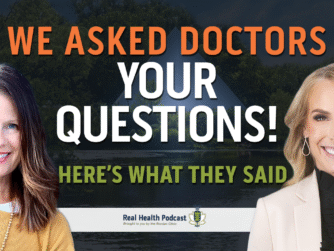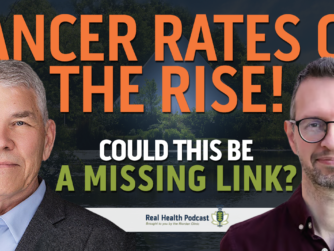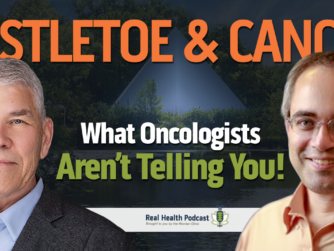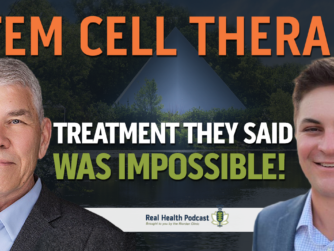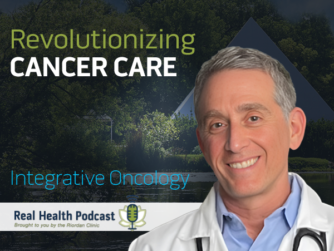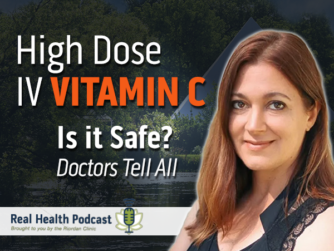In this episode, Leah Chischilly talks to Dr. Ron about the importance of gut health and how it impacts many other facets of our health and well-being.
Thank You To This Episode’s Sponsor
Episode Links and Promotions
Metabolical: The Lure and the Lies of Processed Food, Nutrition, and Modern Medicine
Episode Transcript
Disclaimer: The information contained on The Real Health Podcast and the resources mentioned are for educational purposes only. They are not intended as and shall not be understood or construed as medical or health advice. The information contained on this podcast is not a substitute for medical or health advice from a professional who is aware of the facts and circumstances of your individual situation. Information provided by hosts and guests on The Real Health Podcast or the use of any products or services mentioned does not create a practitioner-patient relationship between you and any persons affiliated with this podcast.
Intro: This is the Real Health Podcast, brought to you by Riordan Clinic. Our mission is to bring you the latest information and top experts in functional and integrative medicine to help you make informed decisions on your path to real health.
Leah Chischilly: Welcome, everybody, to The Real Health Podcast. I’m your host today, Leah Chischilly. And with me is Dr. Ron. Hi, Dr. Ron.
Dr. Ron: Hi, Leah.
Leah Chischilly: Welcome. Today we have a really interesting episode for everyone. We’re going to talk a lot about gut health and how important it is for overall health. And also, some of the implications that it has with autoimmune disease. And then some potential things that can possibly help with gut health that maybe people aren’t readily aware of. So I think it’s going to be a good conversation.
Dr. Ron: Absolutely. And I’m just thrilled because I’ve been reading Dr. Robert Lustig’s new book, Metabolical. He’s all about sugar and metabolism, but he’s boiled the whole book down to two things that you need to do. Number one, you need to protect your liver. And number two is feed your gut.
Leah Chischilly: Feed your gut. So before we dive into the gut overall, I think just to clarify for people because if you’re not really in the medical space, we think of gut as everything from the bottom of our ribs to our pelvis. And it’s everything that’s going on inside there. So when people are talking about gut and healing your gut, what exactly are they talking about?
Dr. Ron: Well, you have to choose the right foods. You have to set the right stage. Even your prayer before your meal kind of calms you down. The kind of company you’re keeping. The quality of food, the colors, the wholeness, the freshness. Chewing your food thoroughly, enjoying your food, not rushing. The actual digestion of the food. Then the enzymes that break it down even further. Then it gets into the intestine, where the gut bacteria have a role to play. Then in the colon, that’s a very important area of incubation of good bacteria. So when we say gut, it’s a lot of different things happening at the same time.
Leah Chischilly: Yeah, well, that’s good to know. So it’s not just pinpointing large intestines, small intestines, the whole gamut of things. And even out into the lifestyle that people live.
Dr. Ron: It’s nourishment. And without good nourishment, our health is going to go downhill.
Leah Chischilly: Yeah. So talk to me a little bit about good bacteria, bad bacteria.
Dr. Ron: This is what we call the microbiome. And we have anywhere from 10 to 17 trillion cells in our body, but something like 90 trillion friendly bacteria that live in our digestive system. And we hope they’re friendly, anyway. Because, if due to antibiotics, due to poor digestion, due to another factor that we’ll get into in just a second here, you can have a disruption of your gut flora, and that can make you miserable. That can cause weight gain. That can cause increased susceptibility to infection. And as we’ll talk about, it can increase your risk for autoimmune diseases.
Leah Chischilly: And so how might someone know if their gut is out of whack? Is it always digestive symptoms or…
Dr. Ron: Yeah. A lot of people are diagnosed with irritable bowel syndrome. And when you ask what is that? It’s a bloating, it’s a gassy, it’s an upset stomach. Just, there’s not a good sense, like if you’ve had a really good meal and you’re sitting back and relaxing, you know when you’re digesting well. But a lot of people don’t relax when they eat. They’re in a big hurry, or they eat too many processed foods, and then they don’t feel good after they eat. And you should feel good after you eat.
Leah Chischilly: I think that’s a very important point, is that you need to feel good. And that’s how you know you’re eating well for your body.
Dr. Ron: Yeah. Satiated. You’re satiated.
Leah Chischilly: Yeah. So let’s get into the autoimmune piece a little bit. How exactly does the gut, the health of the gut, play into autoimmune disease?
Dr. Ron: So autoimmune diseases, and there’s like 80 or 100 of them; basically, it’s where your immune system, which is meant to protect you against unfriendly bacteria, for some reason, it starts to cross-react. And instead of just getting rid of the bad guys, it starts to react against different tissues in your body. People that have rheumatoid arthritis, the immune system is reacting against the lining of their joints. People that have Sjogren’s disease, they have dry eyes and dry mouth. Multiple myeloma it’s an autoimmune reaction against the myelin of your central nervous system. So there’s about 80 or 90 of these, but we’re finding out that the common denominator is what people are calling leaky gut.
Leah Chischilly: So what is that?
Dr. Ron: Well, leaky gut basically means that the normal lining of the gut, and there is a lining of cells, that’s just one cell thickness deep in your gut. So they normally have what’s called tight junctions. But when these junctions are somehow injured or impaired, then certain parts of the food will be absorbed into the body before it’s fully digested. And then that’s how people can get food allergy reactions.
Dr. Ron: Or even worse, some of the bad bacteria that will get into the digestive system will get into the bloodstream and trigger infection. And some of these bacteria will actually form colonization, and they call it chronic pathogen colonization or biofilms. And these can then set up chronic inflammation in the body. Oftentimes we’ll do what’s called a C-reactive protein, and people will have an elevation. And they’ll say, I don’t know why I have this because I’m not really having any symptoms. A lot of times, it’s a chronic pathogen colonization process that’s causing that.
Leah Chischilly: So I have a couple of questions. What are some of the main causes of leaky gut? And is leaky gut, is it typically the cause of an autoimmune condition, or is it a result of an autoimmune condition? Or is that unclear?
Dr. Ron: No, I’d say yes. It’s kind of a cause and a result at the same time. And so, ultimately, what you’re trying to do is improve digestion. You’re trying to foster good bacteria. This is why people take prebiotics, probiotics, and now they even have postbiotics that you can take that support the good bacteria in the gut.
Leah Chischilly: Oh, I wasn’t aware of postbiotics. That’s new. Can you share a little bit about that?
Dr. Ron: Sure. There are short-chain fatty acids that you need to have in your colon in order for your colon to be healthy, and one of the main ones is butyric acid. It’s a short-chain fatty acid. It was hard to get it down there. And now they’ve come up with tributyrin, which is where they’ve attached three butyric acids to a glycerin molecule, which has three carbons. And it makes it all the way down to the large intestine, and it gives you better large intestinal health. So that’s an example of a postbiotic.
Leah Chischilly: Very interesting. That’s something new to me.
Advertisement: There’s a lot more to this conversation, and it’s coming up right after a quick break. Today’s podcast is brought to you by LivOn Labs, makers of liposomal vitamins and supplements. LivOn uses liposomal encapsulation technology to protect nutrients from destruction in the digestive system. This allows for more efficient delivery of essential vitamins and nutrients. Choose from various supplements that support health and wellbeing, such as lypo-spheric vitamin C, magnesium, glutathione, and more. To learn more, visit LivOn Labs. That’s L-I-V-O-N labs.com.
Dr. Ron: So prebiotics, postbiotics, and probiotics are all beneficial. But chewing your food well, choosing healthy foods, having a period of rest after you eat so that you can start to digest. Making sure that you do not take antacids too excessively. One of the big problems in our society is that a lot of people who eat too fast have reflux. And so they get put on acid blockers that totally block the acid, or 90% block the acid. And so then you don’t get your food broken down very well. And so then you get overgrowth in your small intestine, which we call small intestine bacterial overgrowth, SIBO. So SIBO is an example of indigestion, long-term indigestion illness that you can get into.
Dr. Ron: Just to go back to your original question, though, how does all of this relate to autoimmune disease? We want to bring it back home here to that topic. And I think the way it relates is that because people have these pathogens getting into their body and getting into their gut, that’s what’s disrupting these tight junctions. Now the special thing that I wanted to make sure we got across in this particular episode is that there’s been a discovery, and it ties in with COVID.
Dr. Ron: And one of my good friends, and a person who has written 13 books now on health and wellness is Dr. Thomas Levy. And in the process of treating his own chronic sinusitis, he began using a small nebulizer and trying vitamin C and magnesium and all kinds of different natural products, colloidal silver, to try to clear up his sinuses and his nasal congestion. And so the thing that worked the best, though, was low concentrations of food-grade hydrogen peroxide.
Dr. Ron: And so that was working great for him just when the COVID epidemic hit. And he had this brilliant idea. Wait a minute, COVID, in order for it to make a person sick, it has to incubate in the nasal cavity and in the back of the throat, and maybe even in the sinuses. And he realized that this peroxide, food-grade peroxide nebulization is a way to disinfect that area. And so he has written a book called Rapid Virus Recovery that anyone can download free from medfoxpub.com, and it gives the whole story of how great this is.
Dr. Ron: But the reason I bring it up is that a side benefit is he found that his own digestion improved, his own gut function improved, his irritable bowel went away. And the only thing he could think of that would explain this is that we forget that our nose and our sinuses is a kind of filtration system of the air we breathe. We’re supposed to be nasal breathers, and a lot of people breathe too much to their mouth. But when you breathe through your nose, it collects the garbage before it gets down to your lungs. But what people have not thought about is, where does that go? And we swallow it. We swallow a lot of the junk that gets filtered by the nose.
Dr. Ron: And his thinking is, is that maybe people that have nasal congestion, or even people that have just run of the mill discomfort in their nose and sinuses, they may be swallowing a whole bunch of pathologic bacteria. And maybe mold and maybe viruses and maybe dust and various things that is polluting their gut. And when he started using the nebulizer on a regular basis, he was swallowing less and less of the pathologic stuff. And so his gut was able to heal itself, and the leakiness went away, and his bowel function improved. So here is a very simple way to prevent respiratory infections, including COVID and other viruses. And at the same time, improve your digestive function and reduce your risk of autoimmune disease.
Leah Chischilly: Now, I have to ask, are there risks involved with doing something like that?
Dr. Ron: The only risk is if you understand the recipe, which is you have to use, preferably food-grade peroxide, 3%. There are other higher percent peroxides out there, only use 3%. And you want to dilute it down, a quarter of a teaspoon of the 3% food-grade peroxide in a teaspoon of saline. And you can make your own saline by taking a half a teaspoon of salt in a pint of water. And use a teaspoon of that saline, a quarter teaspoon of the peroxide. You can use regular peroxide, but the food-grade is better long term.
Leah Chischilly: Now, is that recipe available in his book?
Dr. Ron:It is.
Leah Chischilly: Okay.
Dr. Ron: And I strongly recommend people getting Rapid Virus Recovery from that website. It’s rvr.medfoxpub.com, and it’s just a free download. And you can hear all about this, and protect yourself from infection and heal your gut at the same time.
Leah Chischilly: So I also have to ask, have you tried this?
Dr. Ron: Oh, I’ve been on it for probably about six months now. And now, he’s going to kill me for telling the audience this, but we formed a special club called the PBM Club.
Leah Chischilly: And what does that mean?
Dr. Ron: Perfect bowel movement. So we’re inviting everyone out there to become part of the PBM Club by improving your digestive health.
Leah Chischilly: That’s hilarious.
Dr. Ron: You might as well have some fun and not get sick at the same time.
Leah Chischilly: Yeah. But it’s so important, and I think people forget about that. I haven’t talked a lot about it, but I’m an acupuncturist. In Chinese Medicine background, talking about bowel movements is a really big deal. And if we really use it as a diagnostic tool of sorts. So I think that that’s funny because ideally, we would want a PBM for everybody.
Dr. Ron: Yeah. Well, Dr. Levy and I have both turned that corner of being in the 70s, our 70s now. And I guess as you get older, you just start thinking about those things more.
Leah Chischilly: It’s the little things that matter.
Dr. Ron: Yeah. It’s big. It’s a big thing, actually. People that have bowel problems they’re miserable.
Leah Chischilly: It’s so true. And it’s so common. So just for our listeners, obviously, go check out the book, maybe think about incorporating that into your life. But just everyday things that people can do, what types of foods or activities should they avoid? What types of foods should they include?
Dr. Ron: Back to Dr. Lustig’s book. He says the whole big problem in the world, not just the United States, but in the world, is that we’ve shifted way too much to processed foods. And so if we can get back to real food, whole food. Organic, if you can afford it. Colorful foods, a good variety of foods, all of these types of things. The big offenders in the modern diet is all the fructose corn syrup stuff, that’s just awful. Sugar in general, too much sugar.
Dr. Ron: But one thing I hadn’t thought about is the vegetable oils that are being used in processed foods have been obtained by these large industrial presses that presses the oil out of the seeds. And this creates a tremendous amount of heat, which oxidizes the oils and turns them into trans fats. And these trans fats, and the fructose sugars, they’re killing people. They’re turning people into diabetics, and they’re at the root of a lot of autoimmune diseases and cancer.
Leah Chischilly: Yeah. What about lifestyle factors? Are there other things, from an external environment perspective, that affect gut health and overall health?
Dr. Ron: Yeah. Everything affects gut style health. And so your sleep quality, your amount of stress, your quality of your relationships. Most stress, if you ask people, what’s the number one cause of their stress, it’s a dysfunctional relationship. So learning how to really establish good friendships, with even your spouse, even your coworkers. Friendship is really the foundation of good relationship health. Get regular exercise, go to bed the same time every night and get a good night’s rest. Watch out for the toxic factors in our environment, reduce those as best you can. And choose good healthy foods.
Leah Chischilly: Yeah, all great advice. And I find that when we talk about things, it all really comes back to the basics. It’s like, if you can master the basics, you can really start to build your own version of real health. It doesn’t have to be complicated, but that doesn’t necessarily mean that it’s easy. So for someone who’s just really, really struggling, what could be a first step that they take?
Dr. Ron: Well, first, have the resolution within your mind and heart that I’m understanding that I am the only person that can make better choices for me. No one can do it for me. So taking responsibility for better health choices is probably the beginning point. A lot of people, that happens when they hit a crisis point, and then they’ll say, okay, now I’m going to change. It’s probably better to make the changes before the crisis, if possible. And make small changes on a regular basis. And just stick with it, and then as you start to feel better, that’s the reward for the effort that you put into this. Is just feeling a little bit better every day.
Leah Chischilly: Every day. Awesome. Well, I think we’ll end it on that note. Dr. Ron, great advice. And everyone, go check out that book from Dr. Tom Levy, and we’ll link it up in the show notes for you. And we hope to talk to you again soon.
Dr. Ron: And just remember, you too can join the PBM Club.
Leah Chischilly: Yes. Do not forget the PBM Club.
Dr. Ron: All right. Take care.
Leah Chischilly: Take care.
Outro: Thank you for listening to The Real Health Podcast. If you enjoy this episode, be sure to subscribe and leave us a review. You can also find all of the episodes and show notes over at realhealthpodcast.org. Also, be sure to visit riordanclinic.org, where you will find hundreds of videos and articles to help you create your own version of real health.


